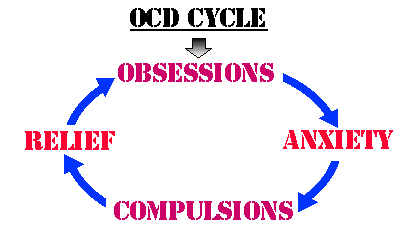By M. Williams, Ph.D.
Obsessive-Compulsive Disorder (OCD) is a psychiatric mental disorder characterized by obsessive thoughts and/or compulsive behaviors that significantly interfere with normal life. Obsessions are unwanted, recurrent, and disturbing thoughts which the person cannot suppress and which can cause overwhelming anxiety.
Compulsions are repetitive, ritualized behaviors that the person feels driven to perform to alleviate the anxiety of the obsessions. The obsessive and compulsive rituals can occupy many hours of each day.
What OCD is not
There are many disorders that have been mistakenly labeled as OCD. Some of them are the eating disorders, compulsive shopping, kleptomania, alcoholism, trichotillomania, obsessive-compulsive personality, and body dysmorphic disorder.
While there are similarities between OCD and these other disorders, there are also significant differences. Similar disorders that are not OCD are often called OC Spectrum Disorders. Some of them require similar treatment, but for others the treatment is different.
In addition, people with OCD frequently suffer from mood disorders, such as depression or bipolar disorder, as well as OCD.
Does OCD Always Include Both Obsessions and Compulsions?
Approximately 80 percent of patients with OCD have both obsessions and compulsions; 20 percent have only obsessions or only compulsions.
However, there are a variety of things people with OCD may do in response to their obsessions that may not be obvious compulsions. These may include things such as thought suppression, avoidance, brief behavioral maneuvers, and mental neutralizing strategies. Thus, many of the cases that are often called "pure obsessionals" involve mental compulsions, so in fact the person does have both obsessions and compulsions. Likewise, people with compulsions but no obsessions may in fact have obsessions that are difficult for the person with OCD to describe, such as the notion that something just "does not feel right."
Who Suffers from OCD?
Over four million people in the U.S. suffer from OCD, or up to one in every 50 Americans. OCD affects men, women, and children, as well as people of all races, religions, and socioeconomic backgrounds.
OCD can start at any age although most commonly in childhood, adolescence, or early adulthood. It is a waxing and waning disorder, but left untreated the disorder can escalate in severity.
What are the Most Common Symptoms of OCD?
Most Common Obsessions
- Fear of contamination
- Fear of causing harm to another
- Fear of making a mistake
- Fear of behaving in a socially unacceptable manner
- Need for symmetry or exactness
- Excessive doubt
- Religious and sexual concerns
Most Common Compulsions
- Cleaning/Washing
- Checking
- Arranging/Organizing
- Collecting/Hoarding
- Counting/Repeating
- Touching or tapping
What Causes OCD?
OCD is thought by many to be a physical or biological disease. Researchers have identified specific areas of the brain that are affected: the orbitofrontal cortex, cingulate gyrus, and striatum. Brain imaging studies indicate that these areas are overactive in people with OCD.
The disorder involves neurotransmitters -- brain chemicals that carry impulses from one nerve cell to another -- that behave abnormally in the affected areas of the brain. Serotonin is one important neurotransmitter involved in the disorder, as well as dopamine and glutamine.
Stress alone does not cause OCD; however, a stressful event like the death of a loved one, birth of a child, or divorce can trigger the onset of the disorder. It may be safe to say that a person is born with a genetic predisposition to having OCD, which is often dormant until some stressful event occurs and triggers the OCD into an active phase. It is important for people who have OCD to learn how to deal with stress in healthy ways.
How Do You Treat OCD?
Standard treatment includes drug therapy, behavior therapy, or a combination of both. It was commonly believed that a combination of medication and behavior therapy is most effective in treating OCD, but new research has shown that behavioral therapy is most effective.
Medications in two different categories are available to treat OCD, including one of the tricyclic antidepressants (Anafranil) and several of the selective serotonin reuptake inhibitors, or SSRIs (such as Prozac, Luvox, and Zoloft). These medications help increase the brain's balance of serotonin — a chemical linked to OCD. On average, people taking medication for OCD can expect a 30% reduction in symptoms. More about medications...
Behavior therapy teaches people with OCD to confront their fears and reduce the anxiety without performing the rituals. This should not be confused with other types of therapies that involve talking about one's past, such as psychoanalysis. Behavior therapy, called exposure and ritual prevention, is effective for 80% of people with OCD. More about psychotherapy for OCD...
How Can Someone Get Help for OCD?
People who think they have OCD or think they know someone who might should talk to a qualified mental health professional with expertise in anxiety disorders. One option that may help is OCD Counseling.
People can get better if they seek help and get the appropriate treatment.
Other Facts About OCD
- OCD is a psychiatric illness recognized
by experts throughout the world.
- OCD is an anxiety disorder characterized
by symptoms that can include powerful, unwanted, or recurrent
thoughts and/or compulsive, repetitive behaviors.
- OCD is the fourth most common mental
illness and affects over 4 million people in the United
States.
- People with OCD are not "crazy,"
although they may sometimes feel that way because they are troubled
by thoughts and actions that they know are inappropriate.
- People with OCD are often anxious and depressed.
- People with OCD often believe they
are the only ones who have irrational, obsessive thoughts, and
are therefore often ashamed and afraid to tell anyone or to seek
help. Diagnosis is delayed until these symptoms are "unmasked."
- Having OCD is not a sign of weakness
or a lack of willpower in stopping the thoughts and behaviors.
- Although the exact cause is not
known, experts believe that OCD may be caused in part by an imbalance of
a chemical in the brain called serotonin.
- OCD is a treatable disease;
effective medications and behavioral therapy techniques are available.
- There are many resources available for people with OCD and their loved ones.
Related Articles






